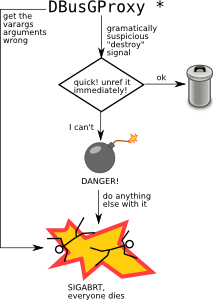
I've recently found myself explaining
polkit (formerly PolicyKit) to one of
Collabora's clients, and thought that
blogging about the same topic might be useful for
other people who are confused by it;
so, here is why
udisks2 and
polkit are the way they are.
As always, opinions in this blog are my own, not Collabora's.
Privileged actions
Broadly, there are two ways a process can do something: it can do it
directly (i.e. ask the kernel directly), or it can use inter-process
communication to ask a service to do that operation on its behalf.
If it does it directly, the components that say whether it can succeed
are the Linux kernel's normal permissions checks
(
DAC),
and if configured, AppArmor, SELinux or a similar
MAC layer.
All very simple so far.
Unfortunately, the kernel's relatively coarse-grained checks are not sufficient
to express the sorts of policies that exist on a desktop/laptop/mobile
system. My favourite example for this sort of thing is mounting filesystems.
If I plug in a USB stick with a FAT filesystem, it's reasonable to expect
my chosen user interface to either mount it automatically, or
let me press a button to mount it. Similarly, to avoid data loss, I
should be able to unmount it when I'm finished with it.
However, mounting and unmounting a USB stick is fundamentally the same
system call as mounting and unmounting any other filesystem - and if
ordinary users can do arbitrary mount system calls, they can cause all
sorts of chaos, for instance by mounting a filesystem that contains setuid
executables (privilege escalation), or umounting a critical OS filesystem
like
/usr (denial of service). Something needs to arbitrate: you can mount
filesystems, but only under certain conditions .
The kernel developer motto for this sort of thing is mechanism, not policy :
they are very keen to avoid encoding particular environments' policies
(the sort of thing you could think of as business rules ) in the kernel,
because that makes it non-generic and hard to maintain. As a result,
direct mount/unmount actions are only allowed by privileged processes,
and it's up to user-space processes to arrange for a privileged process
to make the desired mount syscall.
Here are some other privileged actions which laptop/desktop users can
reasonably expect to just work , with or without requiring a sysadmin-like
(root-equivalent) user:
- reconfiguring networking (privileged because, in the general case, it's an
availability and potentially integrity issue)
- installing, upgrading or removing packages (privileged because, in the
general case, it can result in arbitrary root code execution)
- suspending or shutting down the system (privileged because you wouldn't
want random people doing this on your server, but should normally be
allowed on e.g. laptops for people with physical access, because they could
just disconnect the power anyway)
In environments that use a MAC framework like AppArmor, actions that
would normally be allowed can become privileged: for instance, in a
framework for sandboxed applications, most apps shouldn't be allowed to
record audio. This prevents carrying out these actions directly,
again resulting in the only way to achieve them being to ask a service
to carry out the action.
Ask a system service to do it
On to the next design, then: I can submit a request to a privileged process,
which does some checks to make sure I'm not trying to break the system
(or alternatively, that I have enough sysadmin rights that I'm allowed
to break the system if I want to), and then does the privileged
action for me.
You might think I'm about to start discussing D-Bus and daemons, but
actually, a prominent earlier implementation of this was mount(8), which
is normally setuid root:
% ls -l /bin/mount
-rwsr-xr-x 1 root root 40000 May 22 11:37 /bin/mount
If you look at it from an odd angle, this is inter-process communication
across a privilege boundary: I run the setuid executable, creating a
process. Because the executable has the setuid bit set, the kernel makes
the process highly privileged: its effective uid is root, and it has
all the necessary capabilities to mount filesystems. I submit the request
by passing it in the command-line arguments. mount does some checks -
specifically, it looks in
/etc/fstab to see whether the filesystem I'm
trying to mount has the
user or
users flag - then carries out the
mount system call.
There are a few obvious problems with this:
- When machines had
a static set of hardware devices
(and a sysadmin who knew how to configure them), it might have
made sense to list them all in /etc/fstab; but this is not a useful
solution if you can plug in any number of USB drives, or if you are
a non-expert user with Linux on your laptop. The decision
ought to be based on general attributes of devices, such as is removable? ,
and on the role of the machine.
- Setuid executables are
alarmingly easy to get wrong
so it is not
necessarily
wise
to assume that mount(8) is safe to be setuid.
- One fact that a reasonable security policy might include is users who
are logged in remotely should have less control over physically present
devices than those who are physically present - but that sort of thing
can't be checked by mount(8) without specifically teaching the
mount binary about it.
Ask a system service to do it, via D-Bus or other IPC
To avoid the issues of setuid, we could use inter-process communication in
the traditional sense: run a privileged daemon (on boot or on-demand),
make it listen for requests, and use the IPC channel as our privilege boundary.
udisks2 is one such privileged daemon, which uses D-Bus as its IPC channel.
D-Bus is a commonly-used inter-process system; one of its
intended/designed uses is to let user processes and system services
communicate, especially this sort of communication between a privileged
daemon and its less-privileged clients.
People sometimes criticize D-Bus as not doing anything you couldn't do yourself
with some
AF_UNIX sockets. Well, no, of course it doesn't - the important
bit of the reference implementation and the various interoperable
reimplementations consists of a daemon and some
AF_UNIX sockets, and the
rest is
a simple matter of programming.
However, it's sufficient for most uses in its problem space, and is usually better than inventing your
own.
The advantage of D-Bus over doing your own thing is precisely that you
are not doing your own thing: good IPC design is hard, and D-Bus makes
some structural decisions so that fewer application
authors have to think about them. For instance, it has a central hub daemon
(the
dbus-daemon, or message bus ) so that n communicating applications
don't need O(n ) sockets; it uses the
dbus-daemon to provide a
total message ordering
so you don't have to think about message reordering; it has a distributed
naming model (which can also be used as a distributed mutex) so you don't
have to design that; it has a serialization format and a type system so you
don't have to design one of those; it has a framework for activating"
run-on-demand daemons so they don't have to use resources initially,
implemented using a setuid helper and/or systemd; and so on.
If you have religious objections to D-Bus, you can mentally replace
D-Bus with
AF_UNIX or something and most of this article will
still be true.
Is this OK?
In either case -
exec'ing a privileged helper, or submitting a request to a
privileged daemon via IPC - the privileged process has two questions that
it needs to answer before it does its work:
- what am I being asked to do?
- should I do it?
It needs to make some sort of decision on the latter based on the
information available to it. However, before we even get there, there is
another layer:
- did the request get there at all?
In the setuid model, there is a simple security check that you can
apply: you can make
/bin/mount only executable by a particular group,
or only executable by certain AppArmor profiles, or similar. That works
up to a point, but cannot distinguish between physically-present and
not-physically-present users, or other facts that might be interesting
to your local security policy.
Similarly, in the IPC model, you can make certain communication channels
impossible, for instance by using
dbus-daemon's ability to decide which
messages to deliver, or
AF_UNIX sockets' filesystem permissions,
or a MAC framework like AppArmor.
Both of these are quite coarse-grained checks which don't really
understand the finer details of what is going on. If the answer to
"is this safe? is something of the form maybe, it depends on... ,
then they can't do the right thing: they must either let it through
and let the domain-specific privileged process do the check, or deny it
and lose potentially useful functionality.
For instance, in an AppArmor environment, some applications have absolutely no
legitimate reason to talk to
udisks2, so the AppArmor policy can just
block it altogether. However, once again, this is a coarse-grained
check: the kernel has mechanism, not policy, and it doesn't know what
the service does or why. If the application does need to be able to talk
to the service
at all, then finer-grained access control
(obeying some, but not all, requests) has to be the service's job.
dbus-daemon does have the ability to match messages in a relatively
fine-grained way, based on the object path, interface and member in
the message, as well as the routing information that it uses itself
(i.e. the source and destination). However, it is not clear that this
makes a great deal of sense conceptually: these are facts about the
mechanics of the IPC, not facts about the domain-specific request
(because the mechanics of the IPC are all that
dbus-daemon understands).
For instance, taking the
udisks2 example again,
dbus-daemon can't
distinguish between an attempt to adjust mount options for a USB stick
(probably fine) and an attempt to adjust mount options for /usr (not good).
To have a domain-specific security policy, we need a domain-specific
component, for instance
udisks2, to get involved. Unlike
dbus-daemon,
udisks2 knows that not all disks are equal, knows which
categories make sense to distinguish, and can identify which categories
a particular disk is in. So
udisks2 can make a more informed decision.
So, a naive approach might be to write a function in
udisks2 that looks
something like this pseudocode:
may_i_mount_this_disk (user, disk, mount options) boolean
if (user is root user is root-equivalent)
return true;
if (disk is not removable)
return false;
if (mount options are scary)
return false;
if (user is in manipulate non-local disks group)
return true;
if (user is not logged-in locally)
return false;
# https://en.wikipedia.org/wiki/Multiseat_configuration
if (user is not logged-in on the same seat where the disk is
plugged in)
return false;
return true;
Delegating the security policy to something central
The pseudocode security policy outlined above is reasonably
complicated already, and doesn't necessarily cover everything that you
might want to consider.
Meanwhile, not every system is the same. A general-purpose Linux
distribution like Debian might run on server/mainframe systems with only
remote users, personal laptops/desktops with one root-equivalent user,
locked-down corporate laptops/desktops, mobile devices and so on; these
systems should not necessarily all have the same security policy.
Another interesting factor is that for some privileged operations, you
might want to carry out interactive authorization: ask the requesting user
to confirm that the action (which might have come from a background
process) should take place (like Windows'
UAC),
or to prove that the person currently at the keyboard is the same as
the person who logged in by giving their password
(like
sudo).
We could in principle write code for all of this in
udisks2, and in
NetworkManager, and in systemd, ... - but that clearly doesn't scale,
particularly if you want the security policy to be configurable.
Enter
polkit
(formerly PolicyKit), a system service for applying security policies
to actions.
The way
polkit works is that the application does its domain-specific
analysis of the request - in the case of
udisks2, whether the device to
be mounted is removable, whether the mount options are reasonable, etc. -
and converts it into an
action. The action gives
polkit a way to
distinguish between things that are conceptually different, without
needing to know the specifics. For instance,
udisks2 currently divides
up filesystem-mounting into
org.freedesktop.udisks2.filesystem-mount,
org.freedesktop.udisks2.filesystem-mount-fstab,
org.freedesktop.udisks2.filesystem-mount-system and
org.freedesktop.udisks2.filesystem-mount-other-seat.
The application also finds the identity of the user making the request.
Next, the application sends the action, the identity of the requesting
user, and any other interesting facts to
polkit. As currently implemented,
polkit is a D-Bus service, so this is an IPC request via D-Bus.
polkit consults its database of policies in order to choose one of several
results:
- yes, allow it
- no, do not allow it
- ask the user to either authenticate as themselves or as a privileged
(sysadmin) user to allow it, or cancel authentication to not allow it
- ask the user to authenticate the first time, but if they do, remember
that for a while and don't ask again
So how does
polkit decide this? The first thing is that it reads the
machine-readable description of the actions, in
/usr/share/polkit-1/actions,
which specifies a default policy. Next, it evaluates a local security policy
to see what that says. In the current version of
polkit, the local security
policy is configured by writing JavaScript in
/etc/polkit-1/rules.d
(local policy) and
/usr/share/polkit-1/rules.d (OS-vendor defaults).
In older versions such as the one currently shipped in Debian unstable,
there was a plugin architecture; but in practice
nobody wrote plugins for it, and instead everyone used the
example
local authority shipped with
polkit, which was configured
via files in
/etc/polkit-1/localauthority and
/etc/polkit-1/localauthority.d.
These policies can take into account useful facts like:
- what is the action we're talking about?
- is the user logged-in locally? are they active, i.e. they are not just on a
non-current virtual console?
- is the user in particular groups?
For instance, gnome-control-center on Debian installs this snippet:
polkit.addRule(function(action, subject)
if ((action.id == "org.freedesktop.locale1.set-locale"
action.id == "org.freedesktop.locale1.set-keyboard"
action.id == "org.freedesktop.hostname1.set-static-hostname"
action.id == "org.freedesktop.hostname1.set-hostname"
action.id == "org.gnome.controlcenter.datetime.configure") &&
subject.local &&
subject.active &&
subject.isInGroup ("sudo"))
return polkit.Result.YES;
);
which is reasonably close to being pseudocode for active local users in the
sudo group may set the system locale, keyboard layout, hostname and time,
without needing to authenticate . A system administrator could of course
override that by dropping a higher-priority policy for some or all of these
actions into
/etc/polkit-1/rules.d.
Summary
- Kernel-based permission checks are not sufficiently fine-grained to be able
to express some quite reasonable security policies
- Fine-grained access control needs domain-specific understanding
- The kernel doesn't have that information (and neither does
dbus-daemon)
- The privileged service that does the domain-specific thing can provide the
domain-specific understanding to turn the request into an action
polkit evaluates a configurable policy to determine whether privileged
services should carry out requested actions
 What happened about the reproducible
builds effort for this week:
Presentations
On June 7th, Reiner Herrmann
presented the project at the
Gulaschprogrammiernacht 15 in Karlsruhe, Germany.
Video and audio
recordings
in German are available, and so are the slides in
English.
Toolchain fixes
What happened about the reproducible
builds effort for this week:
Presentations
On June 7th, Reiner Herrmann
presented the project at the
Gulaschprogrammiernacht 15 in Karlsruhe, Germany.
Video and audio
recordings
in German are available, and so are the slides in
English.
Toolchain fixes
 I've recently found myself explaining
I've recently found myself explaining 

 I was not much at home during the last two weeks, so not much to report
about RC bug activities. some general observations:
I was not much at home during the last two weeks, so not much to report
about RC bug activities. some general observations:

 There are several friends and family I want to be able to call with free software. The only way I could make it accessible to them was to burn
There are several friends and family I want to be able to call with free software. The only way I could make it accessible to them was to burn  WebRTC has been in the most recent stable releases of
WebRTC has been in the most recent stable releases of 
 Users have
Users have  The bug report
Simon McVittie reported in Debian bug
The bug report
Simon McVittie reported in Debian bug
 As readers of my blog (who care about Debian stuff) may know, I've been
plugging away at the DHCP 4.x packages for some time now.
I first uploaded 4.1.1-P1-7 to unstable in early July, then -8 in mid-July
followed by -9 in late July.
The main reason for the delay (beyond my lack of spare time) was the
coordination with third-party packages that were plonking hooks into
/etc/dhcp3/dhclient- enter,exit -hooks.d. Once that got all squared
away,
As readers of my blog (who care about Debian stuff) may know, I've been
plugging away at the DHCP 4.x packages for some time now.
I first uploaded 4.1.1-P1-7 to unstable in early July, then -8 in mid-July
followed by -9 in late July.
The main reason for the delay (beyond my lack of spare time) was the
coordination with third-party packages that were plonking hooks into
/etc/dhcp3/dhclient- enter,exit -hooks.d. Once that got all squared
away, 
 ...
...